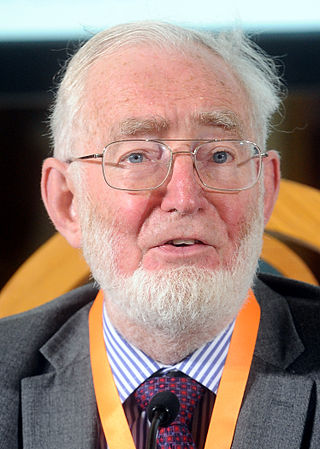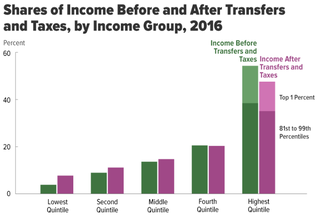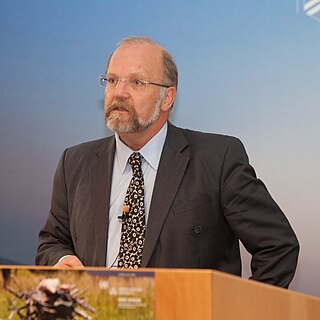
Economics is a social science that studies the production, distribution, and consumption of goods and services.

Economic inequality is an umbrella term for a) income inequality or distribution of income, b) wealth inequality or distribution of wealth, and c) consumption inequality. Each of these can be measured between two or more nations, within a single nation, or between and within sub-populations.

In economics, income distribution covers how a country's total GDP is distributed amongst its population. Economic theory and economic policy have long seen income and its distribution as a central concern. Unequal distribution of income causes economic inequality which is a concern in almost all countries around the world.
François Bourguignon is the former Chief Economist (2003–2007) of the World Bank. He has been the Director of the Paris School of Economics, and from 1985 to his retirement in 2013 a professor of economics at the École des Hautes Études en Sciences Sociales in Paris. in 2016 Bourguignon was awarded the Dan David Prize. He focus on the study of Income and Wealth inequality, Economy wide country studies, International Trade and Trade policy, Education, and Wealth, income, redistribution and tax policy.
Economic progressivism or fiscalprogressivism is a political and economic philosophy incorporating the socioeconomic principles of social democrats and political progressives. These views are often rooted in the concept of social justice and have the goal of improving the human condition through government regulation, social protections and the maintenance of public goods. It is not to be confused with the more general idea of progress in relation to economic growth.

Sir Anthony Barnes Atkinson was a British economist, Centennial Professor at the London School of Economics, and senior research fellow of Nuffield College, Oxford.
In economics, distribution is the way total output, income, or wealth is distributed among individuals or among the factors of production. In general theory and in for example the U.S. National Income and Product Accounts, each unit of output corresponds to a unit of income. One use of national accounts is for classifying factor incomes and measuring their respective shares, as in national Income. But, where focus is on income of persons or households, adjustments to the national accounts or other data sources are frequently used. Here, interest is often on the fraction of income going to the top x percent of households, the next x percent, and so forth, and on the factors that might affect them.

Branko Milanović is a Serbian-American economist. He is most known for his work on income distribution and inequality.

Income inequality has fluctuated considerably in the United States since measurements began around 1915, moving in an arc between peaks in the 1920s and 2000s, with a 30-year period of relatively lower inequality between 1950 and 1980.

Social inequality occurs when resources in a given society are distributed unevenly, typically through norms of allocation, that engender specific patterns along lines of socially defined categories of persons. It poses and creates a gender gap between individuals that limits the accessibility that women have within society. The differentiation preference of access to social goods in the society is brought about by power, religion, kinship, prestige, race, ethnicity, gender, age, sexual orientation, and class. Social inequality usually implies the lack of equality of outcome, but may alternatively be conceptualized in terms of the lack of equality in access to opportunity. This accompanies the way that inequality is presented throughout social economies and the rights that are skilled within this basis. The social rights include labor market, the source of income, health care, and freedom of speech, education, political representation, and participation.
Poverty in Canada refers to the state or condition in which a person or household lacks essential resources—financial or otherwise—to maintain a modest standard of living in their community.
Steven Pressman is an American economist. He is a former Professor of Economics and Finance at Monmouth University in West Long Branch, New Jersey. He has taught at the University of New Hampshire and Trinity College in Hartford, Connecticut.

Redistribution of income and wealth is the transfer of income and wealth from some individuals to others through a social mechanism such as taxation, welfare, public services, land reform, monetary policies, confiscation, divorce or tort law. The term typically refers to redistribution on an economy-wide basis rather than between selected individuals.

Thomas Piketty is a French economist who is a professor of economics at the School for Advanced Studies in the Social Sciences, associate chair at the Paris School of Economics and Centennial Professor of Economics in the International Inequalities Institute at the London School of Economics.

Finn Tarp is a Danish professor of development economics at the University of Copenhagen and former director of UNU-WIDER (2009-2018), Helsinki, Finland.

Erik Thorbecke is a development economist. He is a co-originator of the widely used Foster-Greer-Thorbecke poverty measure and played a significant role in the development and popularization of Social Accounting Matrix. Currently, he is H. E. Babcock Professor of Economics, Emeritus, and Graduate School Professor at Cornell University.
Marc A. Van Audenrode is a Canadian econmoist who is managing principal at Analysis Group, the largest privately held economic consulting firm in the United States, and an adjunct professor at Université de Sherbrooke.

The Center for Distributive, Labor and Social Studies (CEDLAS) is a research center specialising in distribution, labor and social issues in Latin America.
Sanjiv M. Ravi Kanbur, is T.H. Lee Professor of World Affairs, International Professor of Applied Economics, and Professor of Economics at Cornell University. He worked for the World Bank for almost two decades and was the director of the World Development Report.

Effects of income inequality, researchers have found, include higher rates of health and social problems, and lower rates of social goods, a lower population-wide satisfaction and happiness and even a lower level of economic growth when human capital is neglected for high-end consumption. For the top 21 industrialised countries, counting each person equally, life expectancy is lower in more unequal countries. A similar relationship exists among US states.












